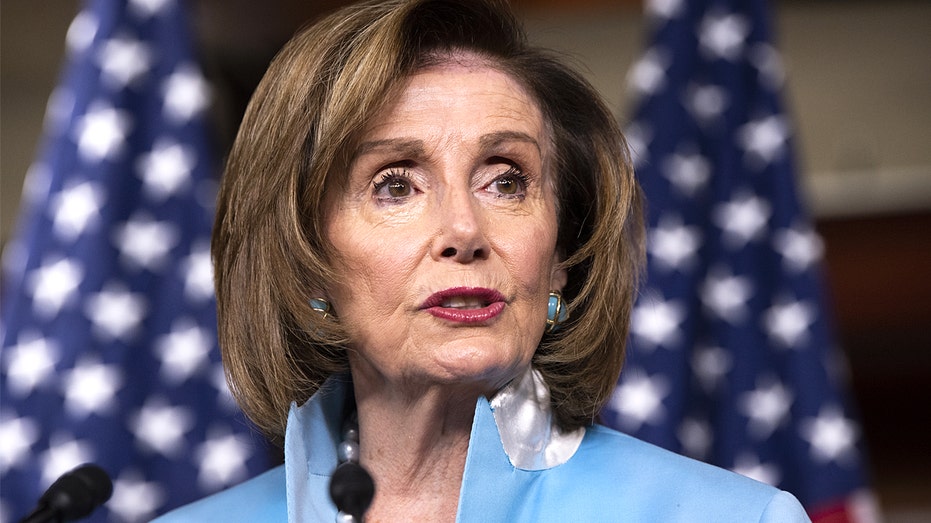Pelosi defends SALT deduction in Dems' spending bill, insists it won't benefit the rich
Pelosi contradicts nonpartisan analyses showing SALT repeal is boon to the rich
Some Democrats look into SALT tax deductions for $3.5 trillion spending bill
Congressional correspondent Chad Pergram has the latest on the bill on 'Cavuto: Coast to Coast'
House Speaker Nancy Pelosi on Thursday defended the inclusion of changes to the state and local tax deduction in President Biden's signature spending plan, even though economists across the political spectrum agree the policy would serve as a windfall to wealthy Americans.
The so-called SALT deduction cap, which is poised to sunset in 2026, limits the amount of state and local taxes that Americans can deduct from their federal taxes to $10,000. Centrist Democrats have been pushing for months to include a full repeal in the president's $1.75 trillion "Build Back Better" plan, but have faced opposition from left-wing lawmakers.
Under the latest proposal currently being considered by the House Rules Committee, the deduction cap would rise from $10,000 to $72,500 for five years (it would be retroactive to 2021). The measure would then extend the cap through 2031.
BIDEN PITCHES REVAMPED MILLIONAIRES TAX, GLOBAL MINIMUM TO FUND SPENDING BILL
"As a supporter of that particular measure in the bill, that's not about tax cuts for wealthy people," Pelosi, D-Calif., told reporters during her weekly press conference. "It's about services for the American people."
Her comments directly contradict an analysis published last week by the nonpartisan Tax Policy Center, which found that two-thirds of people making more than $1 million a year would see an average tax cut of $16,800 next year under the Democrats' spending bill – largely due to the removal of the SALT deduction limit.

UNITED STATES - AUGUST 6: Speaker of the House Nancy Pelosi, D-Calif., conducts her weekly news conference in the Capitol Visitor Center on Friday, August 6, 2021. (Photo By Tom Williams/CQ-Roll Call, Inc via Getty Images) ((Photo By Tom Williams/CQ-Roll Call, Inc via Getty Images) / Getty Images)
A separate analysis from the Committee for a Responsible Federal Budget, a non-partisan organization, found that the temporary increase would cost about $300 billion through 2025 – with $240 billion of that going toward those who make more than $200,000 a year.
"Though this increase in the SALT deduction cap would be less costly than full repeal, it would still cost more than almost any other part of Build Back Better with just the child care subsidies and the combined costs of all clean energy tax credits costing more," the report said. "The benefits would also accrue disproportionately to high earners."
Middle-class Americans would receive an average tax cut of roughly $20 per year, the analysis shows, but the highest earners would see an average tax cut of more than $23,000 from this provision.
But Pelosi insisted that was not the case when asked by reporters whether the top sliver of U.S. households would be the biggest beneficiaries of the policy.

UNITED STATES - OCTOBER 25: The Upper Senate Park fountain is illuminated by multicolored lights in front of the U.S. Capitol dome on Monday morning, Oct. 25, 2021. (Photo by Bill Clark/CQ-Roll Call, Inc via Getty Images) (Photo by Bill Clark/CQ-Roll Call, Inc via Getty Images / Getty Images)
"That isn't the result," she repeatedly said.
CLICK HERE TO READ MORE ON FOX BUSINESS
In recent weeks, Pelosi has clashed with progressive Democrats who have expressed concern that temporarily eliminating the cap would require them to vote for a policy that disproportionately benefits wealthy Americans living in blue coastal states. Sen. Bernie Sanders, I-Vt., has called the repeal "unacceptable."
"At a time of massive income and wealth inequality, the last thing we should be doing is giving more tax breaks to the very rich. Democrats campaigned and won on an agenda that demands that the very wealthy finally pay their fair share, not one that gives them more tax breaks," Sanders said in a statement. "I am open to a compromise approach, which protects the middle class in high-tax states. I will not support more tax breaks for billionaires."





















